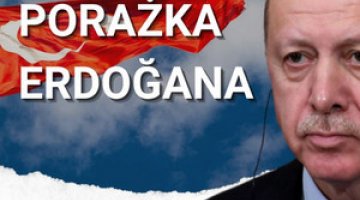Turkey: The sentence in the Balyoz case
On 21 September, a Turkish court sentenced 325 representatives of the Turkish army (including 89 generals and admirals, 24 of whom are in active service) to between 13 and 20 years in prison for taking part in a conspiracy, codenamed Balyoz (sledgehammer). The sentenced allegedly intended to carry out a coup, to topple the government of AKP regarded by the army as an Islamist party) and to bring back the political order based on the principles of Kemalism (including secularity, Turkish nationalism and democracy). This sentence is not legally binding, but it is likely to be upheld by the court of appeal.
The very broadly publicised trial into the Balyoz case can be seen as another step in governing AKP party’s policy of restricting the political role of the military in the state. This sentence is a symbolic defeat for the army and serves as proof of the system transformation which has taken place in Turkey over the past decade, where the army has to a significant extent become subordinate to the civilian government. This sentence strengthens the position of the ruling party led by Prime Minister Recep Tayyip Erdoğan on the internal political scene.
The conflict over the army’s place in Turkish politics
Since the establishment of the Republic of Turkey in 1923, the army has been the superior and autonomous political entity in the state. It has played the role of guardian of the secular and nationalist character of the Republic of Turkey built on the principles of Kemalist ideology, which drew on the state model developed by the founder of the Republic of Turkey, Mustafa Kemal Atatürk. When the army recognised that the government was diverging from the rules of state ideology or was pursuing a policy that put the stability of the state at threat, it intervened either directly by staging military coups (in 1960, 1971 and 1980) or indirectly by putting pressure on the government (e.g., bringing about the dismissal of the Islamist government in 1997). The political role of the army was legitimised by the state ideology and the constitution, which put the army in charge of protecting the secular nature of the state. The excessive impact of the army on the country’s political life has been criticised by both liberal and conservative circles and by the EU. This has also given rise to several political conflicts between the army and those parties which draw on Kemalism (for example, the influential Republican People’s Party (CHP), which is now in opposition).
The ideological and political conflict, which the army and the Kemalist circles currently supporting it are waging against their opponents intensified in 2002 when the parliamentary election was won by the AKP, a conservative-liberal party with a strong Islamic strain (despite – ultimately unsuccessful – attempts to eliminate its leader, Recep Tayyip Erdoğan, from political life on charges of breaching the secularity of the state). The AKP avoided moves which would evidently undermine the secular nature of the state and embarked upon a gradual dismantling of the army’s position. The key steps included: amendments to the constitution which, among others, enabled military officers to be tried at civilian courts; restricting the role of the army in the National Security Council and the High Board of Education; and enforcing personnel reshuffles inside the General Staff. The government’s strong political legitimacy (the AKP won the parliamentary elections three times in a row, each time gaining more votes) was an important factor which made these reforms possible and reduced the army’s ability to successfully resist it. Furthermore, to lessen the resistance from the Kemalist opposition and the army, the AKP justified the reforms with necessity to meet EU membership criteria.
The process of putting the military under civilian control is advanced, and another intervention from the army on the internal scene seems very unlikely. Nevertheless, this process is not finished. The army still has extensive autonomy, for example as regards budget issues (the parliament has little control of the army’s budget), and the General Staff does not report to the defence minister but to the prime minister. For this reason, the government is planning to adopt a new constitution which would codify the relations between the state and the army according to Western standards and would make the army subordinate to the civilian government. Work on the adoption of a new constitution is underway, but due to the insufficient support in parliament (two thirds of the votes are required for parliament to adopt a new constitution or 330 votes to announce a referendum) and the lack of a compromise between the parliamentary groupings, it is unlikely that a new constitution will be adopted any time soon.
The trial into the Balyoz case
The trial into the Balyoz case has been a significant stage in the marginalisation of the army – both actually and symbolically. It began in 2010, soon after an alleged coup plot had been revealed. The main evidence was recordings of a seminar held in 2003, during which high-ranking representatives of the army were allegedly planning a coup. In the court’s opinion, the plan envisaged the destabilisation of the state by staging a series of terrorist attacks in Turkey and provoking Greece to shoot down a Turkish airplane, which would provide the army with a pretext to perform a coup and remove the AKP from power. According to those sentenced, the recordings show a plan of a war-game, while the public prosecution authorities maintain that these were real plans. This unprecedented sentencing of army representatives (including First Army, air force and navy commanders) became possible owing to constitutional amendments adopted in a referendum, which provided for the possibility of military personnel being tried by civilian courts in cases of crimes against state security and the constitutional order. Commentators have expressed various opinions on both the investigation and the trial. Supporters of the government see this as a desirable step towards putting an end to the army’s lawlessness and reducing its role in public life. In the eyes of the opposition, this was proof of the government’s use of the judiciary against its political opponents. Numerous irregularities during the court proceedings and the dubious quality of part of the evidence give credence to these allegations. Proceedings were conducted in parallel to trials on Ergenekon, an alleged terrorist organisation created with the participation of the army, which is reportedly responsible for a significant part of the terrorist attacks in the past decades and which allegedly was planning to destabilise the state.
The consequences
- The sentences in the Balyoz case prove that the role of the military in Turkey has significantly weakened over the past ten years. They will also result in a genuine elimination of a great number of the opponents of the present government from political life and will serve to discourage this (contracting) part of the army which still has ambitions to influence political life in the country. At the same time, the sentences are proof of the fundamental change which has taken place in the political system and culture of Turkey as a consequence of actions taken by the AKP government. The army is no longer the superior political entity, and its actions are controlled to a much greater extent by the democratically elected government. Another military intervention against the civilian government seems rather unlikely at present. The reforms imposing civilian control of the army which have been implemented over the past decade have brought the Turkish political system closer to the Western model.
- However, the process of restricting the army’s political role is not quite over. The planned adoption of the new constitution is expected to be the culmination of the process of making the army subordinate to the civilian government. Given the insufficient number of votes which the ruling party has in the parliament and the lack of consensus between the key parties, the new constitution is unlikely to be adopted soon. This means that the army’s position in the state will remain one of the key objects of political struggle in Turkey, at least in the short term.
- The finalisation of the trial reinforces the position of the ruling AKP party and consolidates its members around Prime Minister Erdoğan. This is important, given the rising discontent with the government seen over the past few months, as well as in the context of the AKP congress to be held in late September. At the congress Erdoğan is expected to seek support for initiatives of key significance for the future of his party and Turkish political scene (including the possibility for key politicians from the AKP to seek re-election to parliament , a possible transition to the presidential system or the escalating threat of Kurdish terrorism).




